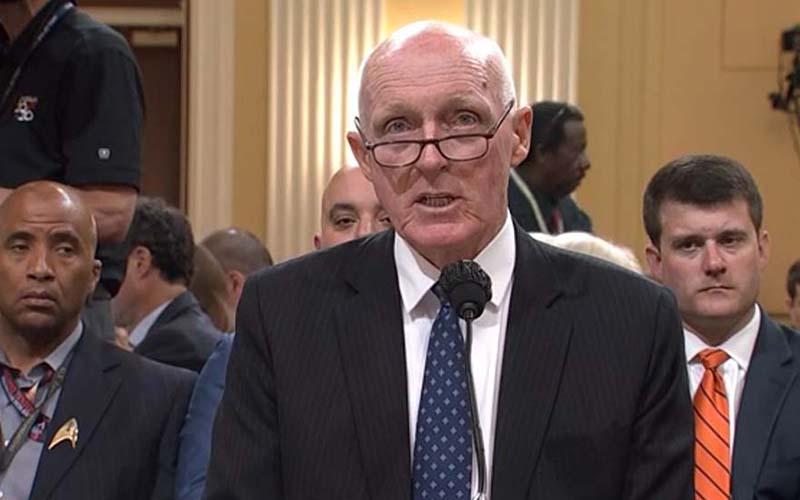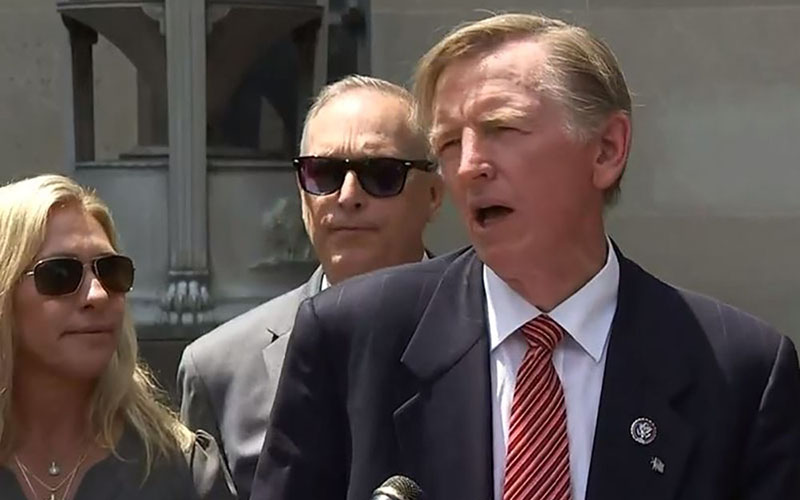
Arizona Republican Party Chairwoman Kelli Ward speaks in Phoenix shortly after the 2020 elections. She has challenged a subpoena of her phone records by the Jan. 6 House committee, and the Supreme Court this week paused that subpoena while it looks at her case. (Photo by Ross D. Franklin/AP/Shutterstock)
WASHINGTON – The Supreme Court has granted a brief reprieve to Arizona GOP Chairwoman Kelli Ward on a subpoena to turn over her phone records to the House committee investigating the Jan. 6 insurrection.
Justice Elena Kagan late Wednesday stayed a lower court’s ruling until at least Friday, when she ordered the committee to reply to Ward’s claims that a subpoena of her phone records violates her free association rights.
In her request for an administrative stay, Ward argued that the subpoena from the House Select Committee Investigating the January 6th Attack on the U.S. Capitol was not meant to find evidence about the attack, but merely to target Republicans whose names would show up in her phone and who would be probed by committee investigators.
“This is about whether the First Amendment still exists, right?” asked Alexander Kolodin, Ward’s attorney. “Whether a federal investigator can come and subpoena your communications with your political party if the rival party gets control … and if you lose an election that you can expect federal investigators to knock on your door.”
But two lower courts have rejected that argument, with a divided three-judge panel of the 9th U.S. Circuit Court of Appeals ruling Saturday that the subpoena was “not about Ward’s politics; it is about her involvement in the events leading up to the Jan. 6 attack.”
The appeals court said that the committee tried a “less-intrusive method” of getting evidence from Ward by interviewing her about the Jan. 6 attack, but that she invoked her Fifth Amendment right to refuse to answer.
Because of that, it said, the committee had to seek the information by other means. It said a “narrowly tailored” subpoena seeking “only Ward’s phone records, only from the critical window of November 1, 2020, through January 31, 2021, and only metadata, not content or location information” was reasonable.
The majority rejected Ward’s argument that any phone records could be shielded under the First Amendment. If that argument held, the appellate court said in an aside, “Narcotics traffickers, or anyone else who might face such subpoenas, would be well advised to make at least a few calls to their preferred political party.”
An attorney for the Jan. 6 committee referred a request for comment to House Speaker Nancy Pelosi’s office, which did not immediately respond Thursday. Calls to attorneys for T-Mobile, which had been ordered to turn over Ward’s phone records, were not returned.
But a spokesperson for the Arizona Democratic Party said Ward’s “repeated attempts to stop the investigation into her activities is not at all surprising given the Arizona Republican Party’s inability to take responsibility for their own actions.”
“Kelli Ward was a key figure in the attempt to install fake electors in Arizona’s 2020 election and throw out the votes of over 1 million Arizonans,” said Lily Morris, the state Democrats’ communications manager.
Ward was one of a number of Arizonans involved in a plan to send false lists of presidential electors to Washington after the 2020 election to cast the state’s 11 electoral votes for Donald Trump instead of Joe Biden, who won the state. The committee has subpoenaed several Arizona officials, including Ward, Rep. Andy Biggs, R-Gilbert, and state Rep. Mark Finchem, R-Tucson, who is currently the GOP nominee for secretary of state.
Arizona State University law professor Paul Bender said he was “surprised” by the stay from Kagan, one of the court’s liberal justices. But he said she is “doing the right thing by being careful and making sure that nobody’s constitutional rights are violated while the court is deciding whether or not to take this case.”
“Kagan must think there’s some merit in the petition – that there’s some chance that the Ninth Circuit was wrong. And she wants to make sure that nothing happens,” Bender said. “But since the committee has to issue a report by the end of the year, and this is going to hold things up, that’s fairly significant.
“She wouldn’t do that, unless she thought there was a plausible possibility that the court was going to grant the Ninth Circuit’s petition,” Bender said.
He said it is likely, with the committee’s response not due until the close of business Friday, that the stay would remain in place until at least next week as the court considers the filings. Bender said “it could be several weeks or it could be several months” before the issue is settled, but also noted that the Jan. 6 committee has a December deadline to complete its investigation.
Morris said she is confident Ward will eventually lose.
“Chairwoman Ward has been involved in her fair share of lawsuits these last few years, many of them unsuccessful in the end,” Morris said. “We expect this attempt to be no different.”
But Kolodin was upbeat.
“I went through all of the Jewish prayers that I know to thank God,” he said, after learning of Kagan’s stay.


